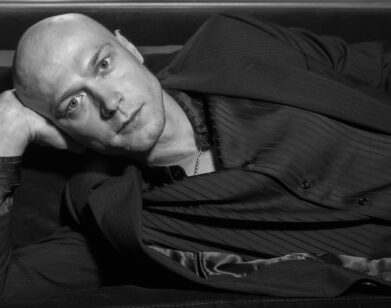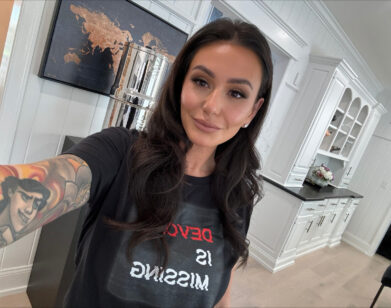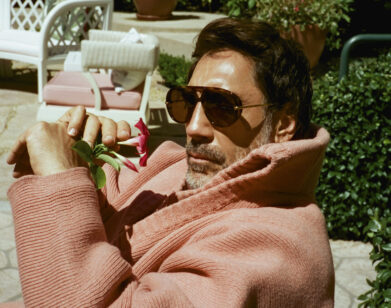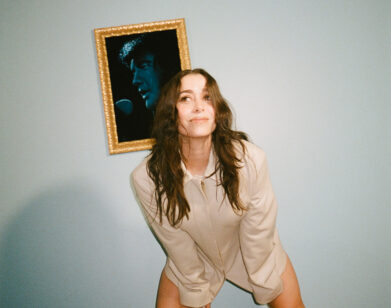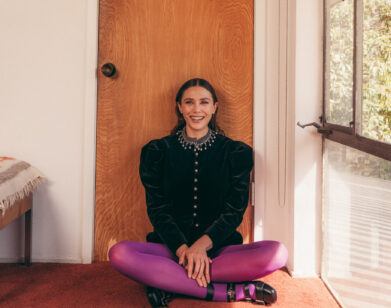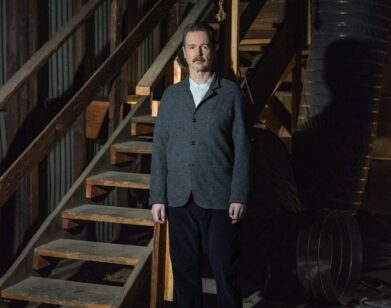Baltimore’s Son
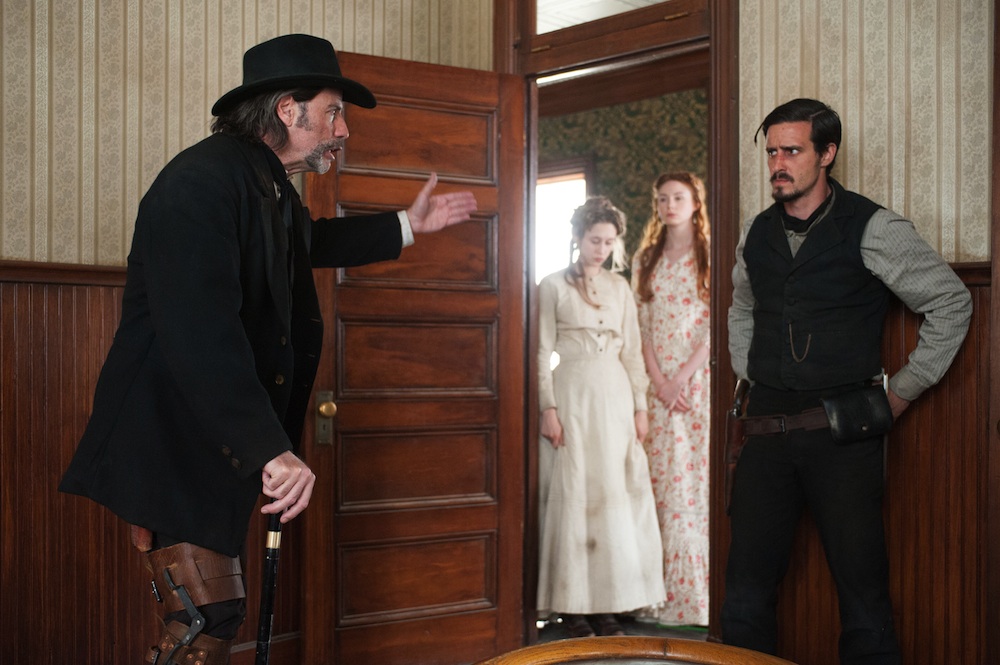
ABOVE: (LEFT TO RIGHT): JOHN TRAVOLTA, TAISSA FARMIGA, KAREN GILLAN, AND JAMES RANSONE IN IN A VALLEY OF VIOLENCE.
After flying to Africa for seven months to shoot HBO’s Iraq War-set miniseries Generation Kill, James Ransone had a realization: “Oh my god, I am an actor!” He jokes that he’s not sure how it happened, and his journey certainly hasn’t been a smooth one. Born and raised in Baltimore, Maryland, Ransone dropped out of film school at the age of 19, and spent his 20s shooting photos, working intermittent acting jobs—most notably the annoying yet lovable Ziggy Sobotka on season two of The Wire—pursuing a career in music, and struggling with a five-year long addiction to heroin.
Then came sobriety and the role as motor mouth Corporal Josh Ray Person on HBO’s Generation Kill. The experience proved to be transformative, and ever since Ransone has been intently amassing credits in everything from Tangerine—an indie about trans sex workers shot on iPhones—to the major market horror films Sinister and Sinister 2 to Spike Lee’s remake of Oldboy.
Ransone is back on the big screen this week in Ti West’s In a Valley of Violence, a horror-western about a wanderer (Ethan Hawke) who’s attacked by a group of rabble-rousers and seeks vengeance. Knowing Ransone’s penchant for portraying unsavory types, it comes as no surprise that he plays the antagonizing ringleader Gilly, making him into a hotheaded, selfish gunslinger who seems almost sympathetically bratty, especially given that his dad (John Travolta) is the sherriff of the local town.
We met Ransone at the Standard East Village in New York to discuss his late 20s epiphany, getting recognized as Ziggy, and the ways in which fear stifles creativity.
In a Valley of Violence comes to theaters this Friday, October 21.
ETHAN SAPIENZA: You grew up in Baltimore—how was that? Do you feel like the city had an influence on you?
JAMES RANSONE: Baltimore breeds a really specific type of weirdo. Animal Collective is from Baltimore. Dan Deacon, John Waters. There’s a through line of weirdness and a hard edge that I see when I meet people from that area. I was fortunate enough to go to an arts school for high school, and I went for theater for a couple of years and learned the real nuts and bolts of classic theater training, like Stanislavski—stuff you learn in college. I decided to then go into the fine arts division of my school, so I think that’s probably what shaped me with going into the movie business since it’s a combination of both. It’s not theater—it’s something else.
SAPIENZA: How did you get into acting and the arts?
RANSONE: I did not fit in well with all of the kids. Adolescence was a really hard time for me—as I think it is for most kids. It’s so uncomfortable. With normal public schools, I used to have a really hard time with them. Then my mom found this school. She was like, “Hey, they’re opening this arts school. You can go. You have to audition.” I would be the first fully graduating class so it would be really easy to get in. I was like, “Yes. I’ll do anything to get away from these people.” I think it saved me as a kid. Going to arts school saved me.
SAPIENZA: Did you find acting therapeutic?
RANSONE: No. Not when you’re young. I still wrestle with the catharsis of acting. I don’t end up playing a lot of likable characters, so I find myself living in a lot of unlikable skin. As a result of that I don’t always feel good. I get a lot more catharsis from taking pictures or painting or making short films. You have some control. I think all art—if it’s good—is a result of really trying to create something that you can’t put into words. Where language ends is where good art begins.
SAPIENZA: I read you didn’t really like theater in high school, is that right?
RANSONE: I like theater; I just don’t really like actors.
SAPIENZA: Then you ended up in film school?
RANSONE: Yeah, I ended up in film school. That’s how I ended up here in New York. I went to [The School of the Visual Arts]. I failed out because I didn’t show up to class.
SAPIENZA: How did you get back into acting that after that?
RANSONE: I kicked around for a couple of years—ironically enough—working for Patrick McMullan, who used to shoot the back covers of Interview. I would go to parties and shoot under his name. My first party I think was Julian Schnabel’s art show. Bowie was there. I got really drunk and I got to take pictures of all these people that I liked since I was a kid. Then they paid me money for it. And I didn’t have to wake up until, like, one. I was like, “This is great for where I am now at 19.” Then—even young—I kind of got burnt out on it really fast since it wasn’t always Julian Schnabel and David Bowie. Sometimes they’d be like, “You have to photograph Tara Reid in the Hamptons.” I don’t want to do that. That doesn’t sound fun for me. Nothing against the Hamptons or her, that’s just not my wheelhouse.
I ended up in that time getting an agent. I booked a commercial, worked on a couple of art films, and then I made enough money where I didn’t have to work for Patrick anymore. I really didn’t think I was an actor at that time—I was playing a lot of music. I thought I was going to be a musician. So I was like, “Yeah I’ll take some acting jobs if I can eat and pay my rent. I’ll just play music,” since that’s what I wanted to do and was doing at the time. I woke up at 27 after being on heroin for five years. It was like I sobered up and I realized, “My job is being an actor. This is crazy!”
SAPIENZA: Was there a specific moment of realization?
RANSONE: Yeah. People think I got sober working on the Generation Kill. I didn’t. I sobered up six or seven months before that. I remember going to Africa and I was going to be there for almost a year. I was number two on the call sheet and I was like, “I think somebody made a mistake. This is too much responsibility for me.”
SAPIENZA: That’s so interesting, since I first saw you in that and I remember thinking how natural and relaxed you seemed. What was the experience like then? Was it difficult or intense?
RANSONE: No. Oh no. It’s still a highlight of my life—and not just the show. Living in Africa, being around the dudes who were being written about—since my dad is a Vietnam vet. Being around these marines who had fought in war and they were young, I got to see some version of my dad as a young man. A lot of things started to make sense to me in a different way. I became really close with Evan Wright—the guy who wrote the book [the series was based on]—and I became really close with some of the marines still to this day. It’s so funny, man. It didn’t do so much for my career but it shaped me and the way that I think about my life. They’re still really palatable [experiences].
SAPIENZA: How do you think it changed you?
RANSONE: Just seeing an entirely different part of the world and how people live differently—seeing a different level of suffering and a different level of happiness and joy that was not an American experience. That made me think about politics and world history in a different way. Listening to men who went off to fight in a war share their experiences in a way that I think would make most people uncomfortable. I think we like to believe that war is something different than what it is. I think they had a lot of fun and I think it really haunted them.
It made me make sense of my upbringing, my own family. My dad was a Green Beret and he got shot in Vietnam. He had to come home. It really affected him and it still affects him to this day. I only saw the bad parts because that’s my dad. When I was around these guys, I saw some good stuff that came out of it too, and it has nothing to do with foreign policy or economics or an American agenda.
A lot of those guys experience a level of intimacy that I think you and I will never know because they’re put in a position where they might get killed every day and literally the person next to them is willing to put their life on the line for another human being. I don’t think there’s anybody in my life that I have that I can unequivocally say would do that for me. With those guys, not only do they think that, they know it. They know that if they ran out into combat while someone was shooting at them and they got shot their friend would run out to pick them up at the risk of being killed.
SAPIENZA: I understand that Iggy Pop was a big influence on you growing up.
RANSONE: Yeah. I think he was an influence on me as a kid in terms of an exhibitionist, but I think that [of] anyone now who has had a consistent influence on my creative thinking is probably Brian Eno.
SAPIENZA: How so?
RANSONE: He’s thinking about art in a way that transcends language. He’s like an artist in a different dimension. He’s thinking about creativity solely for the sake of what is the most interesting thing expressive, unique, accidental—it works, it doesn’t work, there are no consequences. It’s not about money, adoration, sex, it’s not about any of the stuff you get for being creative. It’s about being creative simply for the sake of doing so. Whatever comes out of that is neither a success nor a failure, it just is. That’s where the most beautiful art is always created, when you have someone not worried about what the outcome is.
SAPIENZA: Is that what you try to accomplish in acting?
RANSONE: I just hope I live my life that way. I can’t say that I do all the time but I think it’s something that I strive for or aim to do—just create for the sake of creativity. Honestly, I think Joaquin Phoenix said this, “Everything outside of action and cut is bullshit.” What happens in that thing is the most important thing—not how the movie came out, now how people responded to it, just, “Did I try something that was scary? Did I work hard enough to make something truthful in that moment?” Again, the answer isn’t always yes for me, but you can’t mitigate anyone else’s response. Only you know what you’re trying to accomplish. Any time [you’re] thinking about whether someone’s going to like this or not like this, you’re fucked. You’ve made the decision based in fear. Fear is the cancer to creativity.
SAPIENZA: Do you get annoyed for being recognized as Ziggy?
RANSONE: I did for a long time and now some of it has aged with me being more mature. I’m like, “Yeah, I should embrace that.” It’s part of what I did. I should accept that my career wouldn’t be as rich as it is had I not done that. I mistook people’s perception of me as a projection of them thinking that I was weak or incompetent or that I was that person. I don’t know what they’re thinking so that’s none of my business if they think I’m that character. If they do that’s fine because that means they were really invested in the story that I was lucky enough to be a part of. Some of it also is it was so long ago. I don’t think about it. To me it was 14 years ago.
SAPIENZA: What was it like having John Travolta as a father?
RANSONE: Great! I thought it was going to be terrible but it was great.
SAPIENZA: Why’d you think it was going to be terrible?
RANSONE: Most of the time movie stars are douchebags. He couldn’t have been sweeter. He couldn’t have been more gracious. Truly. If I was playing lip service I’d be like, “Yeah it was fun, moving on.” That one was funny because I was proven really wrong with him. He’s a very thoughtful, considerate person. He’s weirdly, hyper meticulous about his characterization. So meticulous! It’s cool. It’s part of the reason why he’s such a big movie star.
SAPIENZA: When you watch yourself do you forget it’s you?
RANSONE: No. I always see me. I’m never like, “Wow, the muses really came through on that one!” [laughs] I never see that, but that’s the bar that we try to aim for. More often than not I fail disastrously, but so long as I remember that that’s the bar. At least there’s something there.
IN A VALLEY OF VIOLENCE COMES OUT FRIDAY, OCTOBER 21, 2016.

